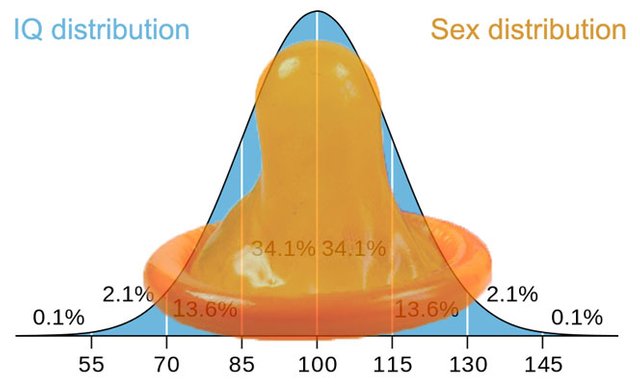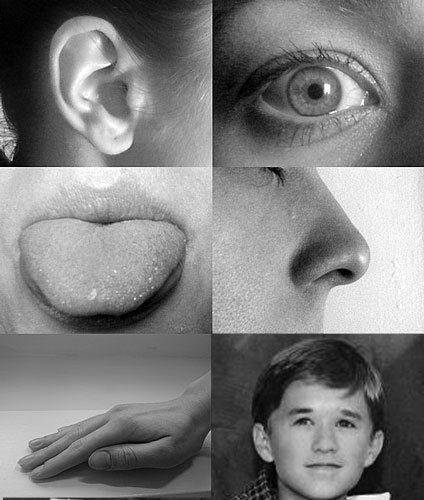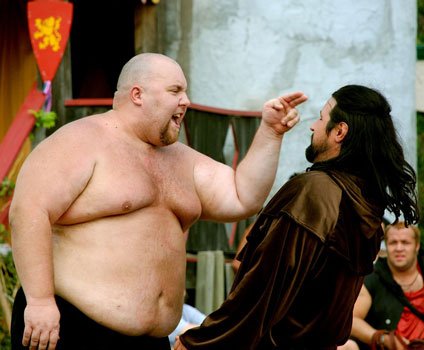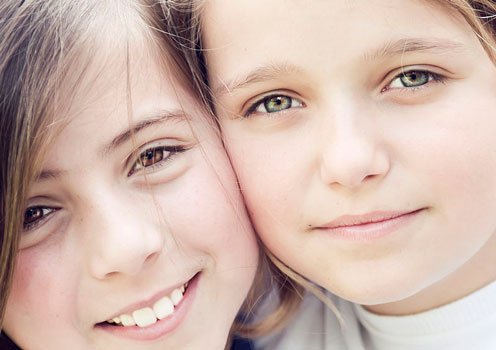Is More Sex Indicative of an Average Intelligence?
Curtain Open
In my previous post, I examined some of the influence pubertal hormones can have on us. Anyone who is still what I call a "hormone denier" is free to experiment by ingesting hormones and see for him/herself.
No? I didn't think so.
Since self-experimentation is out of the question (hey, it's not my fault you're a 🐈), we're left with what the literature tells us.
In this post I'll give some more examples of how pubertal hormones affect us and sex-cast us (it's like typecasting, but for sex). Like last time, I pick some of the examples that stand out more, or offer the most in terms of understanding what's really going on under the hood.
Speaking of a hood...
People Who Have More Sex Are More Likely to Have an Average Intelligence

Average is where the sex is at.
Source: Dmcq & maxpixel w/ Public Domain license, modified.
If you want to have sex earlier than most, it helps to be insecure (girls), low in weight (girls), a smoker or drinker (girls & boys), to have a poor relationship to your parents (boys), and a low household income (boys). At least, those are the factors that are scientifically significantly associated with early sexual activity.[1]
If you want to have more sex, the National Longitudinal Study of Adolescent to Adult Health has some handy advice, since it reveals that:
adolescents at the upper and lower ends of the intelligence distribution were less likely to have sex.[1]
It appears Idiocracy was not exactly right: it's not the stupidest that prevail, but the most average. So if you happen to be a young sexless bright person, like Sheldon of the Big Bang Theory was supposed to be, take comfort in the fact that somewhere out there, you have a dim dark matter twin suffering just as much.
Sensing Though the Hormones

Source: Allan-Hermann Pool w/ CC BY-SA 4.0 license & Thomas from Vienna, Austria w/ CC BY-SA 2.0 license, modified and avail. under same licenses.
Can hormones affect the way you look at the world? They can do more than that: one way in which hormones may affect moods and behaviors, is by influencing our sensory experiences: "taste, vision, touch, audition, smell, and temperature sensitivity"[1]
Hormones can also influence more central systems:
Changes in basal metabolic rate, blood pressure and blood vessel excitability, sympathetic/parasympathetic tone, heart rate, or water and sodium retention may contribute to sensory changes or to changes in overall physical well-being, both of which can have behavioral manifestations.[1]
What kind of behavioral manifestations, you ask?
higher autonomic activity could be associated with [...] feelings of more energy [...]. Slowing of, or sudden changes in, metabolic activity could produce feelings of lethargy or even depression.[1]
And if the hormones that affect all these things are different in men and women, you can imagine how different women and men might be made by them.
Same is true for age. Just to give you a sense of scale:
Testosterone concentrations can increase as much as 20 times their initial concentrations between the ages of 10 and 17 years [...], with the greatest increases occurring between 12 and 14 years[1]
Yeah, that's a lot. But does having more of a sex-typical hormone make you more typical of your sex?
Does More Testosterone Make You More Masculine?

Either the guy has a G spot on his forehead, or they're fighting.
Source: Wadams w/ Pixabay license.
Just because testosterone is associated with males, doesn't mean that higher testosterone = more male, just as having two penises does not make you more male, but rather disfigured.
There is a level at which testosterone yields the most benefits, and that's the ideal level to be at. For example, there was a study[2] that measured males' testosterone, gave them cognitive ability tests, and then separated them into high and low testosterone males. The low testosterone males outperformed the high testosterone males on most tests, specifically those on which males typically outperform women, like mental rotation of shapes and mathematics. So, in a sense, it was the low testosterone males who were more masculine, because they exhibited the most sex-typical and stereotypical male results!
Another study[3] showed that males performed mental shape rotation tasks better in spring, when testosterone levels are lower, than in the fall. Conversely, women performed better during that phase of their cycle when estrogen is low[3] and androgens are high[4].
Such studies suggest that there is some optimum level of testosterone for spatial ability, and that this level is above the level of the average female but below the level of the average male.[3]
Hey, this might explain why people who excel in the arts and the sciences often look kinda androgynous!
And if you think I'm just using the word androgynous to be funny, you're wrong:
androgynous males and females tended to excel at spatial tasks in comparison with those who were more sex stereotypic in appearance.[4]
And it might, more controversially, explain how a specific woman can be better at X (say, math) than the average male, even though the average male is better at X than the average female. The reason might be because the ideal level of X is above the average female, but below the average male, so that the average male might be better at X because on average their distance is closer to the ideal level, but a specific woman can still get closer to it than the average male. To appreciate this explanation (for which I gladly take credit), consider that if the ideal level was above that of the female and the male, the only way for a female to reach it would be to be a male first, at least in the relevant respect (hormones, say, or brain structure).

Did you know that the color used to stereotypically represent the under-represented sex is not represented by any wavelength, or color wheel, or rainbow color? See here & here.
Source: The author's poor photoshop skills.
Storm and Stress

Being super stressed is his superpower.
Source: Hannaford w/ CC BY-SA 2.0 license & Edvard Munch w/ Public Domain license.
Not all our stereotypes about adolescents are true. For example, we might associate puberty with a bigger Adam's apple in boys and bigger breasts in girls, but did you know that obese boys can exhibit both?
Similarly, you might think of adolescence as a time of emotional upheaval, full of teenage angst, rage, conflict, rebellion, and Nirvana music. You'd be in famous company, seeing as the famous psychologist G. Stanley Hall (who is often credited with discovering adolescence) used (and popularized) the term Sturm und Drang (see this section's title) to characterize this period in a growing human's life.
But more modern research challenges this stereotype. A paper entitled Debunking the Myths of Adolescence: Findings from Recent Research summarizes the newer literature as follows:
research findings suggest adolescence should not be characterized as a time of severe emotional upheaval and turmoil[5]
You see, psychologists often form their opinion about humans based on the selected sample of humans they see in their practices as patients. Early descriptions of adolescents were based "on the clinical experiences of psychiatrists and psychoanalysts working with emotionally disturbed youth".[5]
Once nonclinical samples were sampled, however, it was found that:
a significant percentage of adolescents (80%) do not experience adolescent turmoil, relate well to their families and peers, and are comfortable with their social and cultural values[5]
Presumably, the other 20% become researchers of adolescence, ever trying to understand the life period that scarred them.
But seriously, around 1 in 5 adolescents (almost the same ratio as for children and adults) could be having "mental health problems and need help"[5]. But with the stereotype of the adolescent as presented above, parents chuck teens' moodiness up to Sturm und Drang, often ignoring warning signs, which is why it's important to dispel the stereotype.
And, in keeping with the sex-differences angle of this series, I would be remiss not to mention that, depending on the study, girls were found to be 25 to 50% more likely to seek help compared to boys, and boys were more likely to express their issues by "acting out" (substance abuse is given as an example of what the authors mean by "acting out"), whereas girls do it by complaining about their health.[5]
When Does Sexual Attraction Begin?
-.jpg)
They're 10, which means they only look innocent.
Source: Philippe Put w/ CC BY 2.0 license.
Around the age of 10. That is, around the age of adrenarche. Most early researchers put the beginning of sexual attraction at the same time as gonadarche — I suppose because it didn't make sense to feel sexual attraction if you haven't yet gained the ability to procreate. That would mean that boys felt their first sexual attraction at age 14 and girls at age 12. I guess these researchers failed to consult their childhood memories.
Even though the early researchers were wrong about the age, could they still be right about boys feeling their first sexual attraction later than girls? Are boys slow in this growth department, as they are in so many others?
Are Girls More Pubertally Advanced Than Boys?

Source: AnonMoos, toa267 w/ Public Domain license.
Highschool biology teaches us, correctly, that girls are often precocious compared to boys. Here's a typical example that might be offered:
While the average girl enters the pubertal period for height growth at about 10 years of age, the average boy does so about 2 1⁄2 years later.[6]
But while girls are often said to be more advanced, in several metrics, compared to boys of the same age, it seems that when it comes to sex, nobody wants to be late to the party:
girls and boys experience their first sexual attraction [...] at the same age.[7]
Are Black Girls More Pubertally Advanced Than White Girls?

Source: AnonMoos, toa267 w/ Public Domain license & Socialcreatures w/ CC BY 3.0 license.
A large 1997 study conducted on 17077 girls (by 225 clinicians from 65 practices) found that:
At every age for each characteristic, African-American girls were more advanced than white girls.[5]
Snap!
There is no explanation currently for the timing discrepancies (up to 1.5 years' difference in entering puberty and 8.5 months in beginning menses) and the differences in the appearance of the secondary sexual characteristics. It's especially difficult if you adopt the stance that races don't exist.
Is the Onset of Sexual Attraction Culturally Determined?

When it comes to sexual orientation, are humans a tabula rasa or a tintinnabulum?
Source: Marie-Lan Nguyen w/ CC BY 2.5 license.
There are people who say that sexual attraction is socially determined.
Let's just right away dispose of the "strong version" of that position — i.e. that sexual attraction is 100% culturally determined — by mentioning the fact that if that was the case, then, in our heterosexu-archal culture, all boys would be attracted only to girls, and all girls would be attracted only to boys. That's clearly not what happens, and we know that a priori, so I'll spare you the references.
But the "weaker version" might claim that our sexual attractions are at least partly socially determined. How do we test that?
Here's a way: since heterosexuality is socially sanctioned, whereas homosexuality is not, it would follow that homosexuals would develop sexual feelings toward same-sex individuals later in life compared to heterosexuals, since the culture would be suppressing their only-partly-innate feelings.
So what did the studies that looked at the issue find? Specifically, at what age does the onset of sexual attraction occur for male and female homosexuals? You've guessed it:
all [...] studies pinpointed 10 to 10.5 as the mean age of first sexual attraction.[7]
For those of you with goldfish memory, that's the same age as for heterosexuals (see section 'When Does Sexual Attraction Begin?') It appears that the no-one-wants-to-be-late-to-the-sex-party principle holds not just for gender, but also for sexual orientation.
The Etoro example from my last post also points away from the idea that socialization plays a large part in the gender role that we assume: one would expect that drinking semen from age 7 to 17 would make the Etoro irreducibly gay. It doesn't. The Etoro take on wives despite their first experiences having been with men, and their natural inclinations dominate.
Curtain Close: How Do You Know When You've Hit Puberty?

Pubes naturally grow on dicks.
Source: Mihailo1997 w/ CC BY-SA 4.0 license & Bebop7 w/ CC BY-SA 3.0 license, modified & avail. under same licenses.
All the above, as well as the content of the previous post, all of that, both bad and good, need puberty to happen. Since I left out the boring bits of puberty and went straight for the tintinnabulating parts, I left out, among other things, how to know whether you've hit puberty. As an epilogue, I'd like to deglare that omission a bit.
So here's a mnemonic device for ya: puberty, pubes. You enter puberty when your crotch starts growing pubes. Don't believe me?
The adolescent stage begins with puberty, marked by some visible sign of sexual maturation, such as pubic hair growth (indeed the term is derived from the Latin pubescere, to grow hairy).[8]
Till next time, stay hairy.
REFERENCES
Melmed, S., Polonsky, K., Larsen, P. and Kronenberg, H. (2016). Williams textbook of endocrinology. 13th ed. Philadelphia: Elsevier, Inc., pp.1089-1218. Available at: https://www.elsevier.com/books/williams-textbook-of-endocrinology/9780323297387.
Gouchie, C. and Kimura, D. (1991). The relationship between testosterone levels and cognitive ability patterns. Psychoneuroendocrinology, [online] 16(4), pp.323-334. Available at: https://doi.org/10.1016/0306-4530(91)90018-O.
Kimura, D. and Hampson, E. (1994). Cognitive Pattern in Men and Women Is Influenced by Fluctuations in Sex Hormones. Current Directions in Psychological Science, [online] 3(2), pp.57-61. Available at: http://dx.doi.org/10.1111/1467-8721.ep10769964.
Shute, V., Pellegrino, J., Hubert, L. and Reynolds, R. (1983). The relationship between androgen levels and human spatial abilities. Bulletin of the Psychonomic Society, [online] 21(6), pp.465-468. Available at: http://dx.doi.org/10.3758/BF03330010.
OFFER, D. and SCHONERT-REICHL, K. (1992). Debunking the Myths of Adolescence: Findings from Recent Research. Journal of the American Academy of Child & Adolescent Psychiatry, [online] 31(6), pp.1003-1014. Available at: https://doi.org/10.1097/00004583-199211000-00001.
Faust, Margaret S. (1983). Alternative constructions of adolescent growth. In Brooks-Gunn, J. and Petersen, A. (Eds.) Girls at puberty: Biological and psychosocial perspectives. 1st ed. New York: Plenum Press, pp.105-125. Available at: https://www.springer.com/gp/book/9780306411441.
McClintock, M. and Herdt, G. (1996). Rethinking Puberty. Current Directions in Psychological Science, [online] 5(6), pp.178-183. Available at: http://psycnet.apa.org/doi/10.1111/1467-8721.ep11512422.
Bogin, B. (1994). Adolescence in evolutionary perspective. Acta Paediatrica, [online] 83(s406), pp.29-35. Available at: https://doi.org/10.1111/j.1651-2227.1994.tb13418.x.
Mealey, L. (2000). Sex Differences: Developmental and Evolutionary Strategies. 1st ed. Academic Press. Available online at: https://doi.org/10.1016/B978-0-12-487460-2.X5000-4
Buchanan, C., Eccles, J. and Becker, J. (1992). Are adolescents the victims of raging hormones? Evidence for activational effects of hormones on moods and behavior at adolescence. Psychological Bulletin, [online] 111(1), pp.62-107. Available at: http://dx.doi.org/10.1037/0033-2909.111.1.62.
Earlier Sex Differences episodes:
15: Cuming of Age: The Boys That Drink Semen to Become Men
14: Sex Drive: Toward the Old World
13: Sex and the Sexes: Talking Past Each Other
11: Sex Drive: Fantasy Sex Is Where To Find Id
10: Sex Drive: Do Women Have More of Id?
9: The 70-year Cognitive Puzzle That Still Divides The Sexes
8: Do Transsexual Persons Have An Opposite-Sex Brain?
7: Do Parents Stereotype Their Children's Gender?
6: Sex Differences: Do females and males have different brains? Addendum
5: Sex Differences: Do females and males have different brains? Pt 3
4: Sex Differences: Do females and males have different brains? Pt 2
3: Sex Differences: Do females and males have different brains?
2: Sex Differences: Check out the gonads on that one!
1: Sex Differences: Does the Chromosome Maketh the Man?
steemSTEM is the go-to place for science on Steemit. Check it out at @steemstem or browse the #steemSTEM tag or chat live on discord and definitely visit www.steemstem.io
Have you voted for steemSTEM Witness?

Haha, I mentioned your embarrassing teenage articles in my latest post and it turned out that there is one waiting for me here :D
I recently watched a documentary about gender-free education and they mentioned that there is no female or male brain when it comes to structure. But they didn't mention that there is a female and male brain when it comes to hormones. And it is not only the sex-related hormones but all other hormones who determine our behavior. I experienced it myself when I gave birth and was amazed by their power over my body and mind. You know that oxycontin (my favorite hormone) is responsible for breast milk secretion but it also secretes when hugging, touching, bonding or thinking about a loved one. So I could literally feel the oxycontin floating in my body just by thinking about.... my husband. I could feel my breast starting to produce breastmilk just by thinking about how happy I am with him being around :D :D :D I was joking that this was an ultimate test about whether I love him. Hahaha, if next time there is no breastmilk coming out, I will know that I need a divorce :D
So hormones do navigate our behavior but we could definitely trigger the secretion of hormones with our thinking patterns :) So, here comes the free choice :D
Yeah, I know this is TMI... but hey, that's how life is :D And I highly doubt it that you are such a sensitive individual :D
Is it illegal if you spike girls' drinks in bars with oxytocin?
Wait, did I wonder that out loud?
Hahahahahahha, I guess that mother nature was too smart to prevent it from happening :D Simply taking oxycontin doesn't work. The only thing that matters is how many oxycontin receptors do you have :D So, I guess you are switching to neurobiological engineering now? :D
I missed to tell you that you weren't fair to the psychologist in your article :D There are countless psychologists who dwell and flourish in the field of experimental psychology and never ever make conclusions on small sample observations :D
It was just Freud (and a bunch of others) who loved to have a few patients and overgeneralize their symptoms to all the humankind :D
I by no means meant to diminish psychologists' work! It was psychologists, after all, who corrected the mistakes of earlier psychologists. I read psychology all the time in my research and have no less respect for it than other sciences.
I feel much better and more confident after reading this :D
:P
You're back! As usual, poking us gently, challenging our settled notions. An entertaining read, and of course, well researched. I will note two statements that jump out at me:
There will have to be a lot of cold days in July before I accept those results. Just too close to the stereotypical model of the 'hysterical' female.
I don't know about that one, @alexander.alexis :) Most teachers avoid middle school if they can help it (ages 11-14). Generally it's believed that group of kids undergoes a temporary lapse of sanity.
I'm just finishing a post with a little something written with you in mind...a reference our mutual "friend" Freud. I hope you are amused :)
EDIT
I forgot to add, this is brilliant:
Parents should never chuckle when the kids are distressed...really. I worked with suicidal and depressed kids as a teacher. Kids don't talk. We have to look for signs. You don't want to be the parent who overlooked one of those signs. Some mistakes you can't take back.
I was going to reply that perhaps adults are only superficially no longer adolescents, they muzzle their feelings but deep inside they are just as insane as any pubescent, but then Erica covered me in her comment:
Don't you hate it when Erika is right 😁
Found this graph about suicide in the US and this one for suicide in the UK. In both countries, adolescents have the lowest rate of suicide. This doesn't mean they're not miserable. It just means they don't kill themselves.
Personally, it's a great relief to be an adult :)
This once again limits the question of human free will to another aspect, namely hormones. I generally agree, because free will is indeed overrated and we humans are also biologically limited by ... well, our given biology.
As I just heard in an excellent lecture referring to Buddhism and modern technologies, educated Buddhists are also said to explain human perception as follows: through their senses, seeing, hearing, smelling, tasting, touching and how their bodies process these sensations, they should first know about the biological side. According to which a free will is merely a mental concept and my vision, which suggests to me that I have another person in front of me when he physically meets me, describes the process that my vision receptors in my retina send to my brain, which translates this image for me via my neuronal signals. The fact that I still have the reality of a person in a room with me corresponds to a convention so that we can communicate with each other at all.
In so far as hormones become active in a human body (not only in adolescents but also in women who go through menopause and anyone else who has to endure a release of hormonal substances for any reason), physical sensations are influenced. This in turn triggers an influence on mental states, since the two cannot be separated from each other in any way, otherwise we would not be called "individuals", but "dividuals".
So if I have subtracted everything that limits my free will and accept that there are a couple of essential influencing factors, I can make some deliberate decisions with the rest, which will probably make a kind of person out of me, who, aware of his limitations, gets the most out of his possibilities.
"Sturm und Drang" (a very well known term to me as a German) can happen at any time, not just during puberty, yes. With the young, it's just more noticeable, because they do more daring things than the old, who hardly throw themselves out of planes or jump off mountain cliffs, etc.
The one with the hair: Yes, unfortunately. As an elderly lady I have to cope with the fact that my hair grows where ladies usually don't want it. So it wouldn't have needed this request to stay hairy at all. HaHa!
A somewhat simple formula that I'm going to throw in here:
Man minus
= Free will (which still is more than it sounds)
Have a nice day, Alex:)
As someone who doesn't believe in free will at all, I'd say the last sentence should read "= randomness" :P
How would you explain what free will is exactly? I can understand causality, which is one thing causing another, like a billiard ball hitting another. And I can understand randomness as our inability to know the precise causes. But how does one understand free will? It seems here you define it by negation. But then how do you separate it from randomness?
Good question, thanks.
The further back these influencing events are, the less free will I can use on them. So up to no free will at all.
But the less time and space there is between me and an event, the more free will I can use. Free will is therefore the best thing for me to understand, which I experience in interaction with other people - a matter of seconds - in which I go through the following:
I talk to a client and notice that something he says annoys me. I recognize this annoying impulse and decide not to give in to it, it costs me a few seconds, sometimes less than a second - I guess - during which I decide against an annoyed response and instead take a peaceful alternative (or rather an inner shift in attitude). I would call it "tricking my brain" because it had already decided differently than "I". This can happen more often at the beginning of an encounter, but the more often I willingly recognize my inner anger as just, it is not always the determining factor and so I am pleased in the course of a session, for example, my inner impulsive nature, so that towards the end there are significantly fewer moments when I make such a strong conscious intervention. But it can also be that even the smallest flame of emotion is enough to immediately feel impulsive again. Then everything starts all over again.
In no way would I regard this process as a random phenomenon, because it costs me some mindfulness and whenever I forget to be mindful, I remember that there is such a thing as "remorse", because in situations I could have been much more useful than I was. The contrast that these different experiences give me is very remarkable for me personally.
After all, I can also use my free will not to reply to a comment at all, to answer differently, or to answer in two weeks' time.
For example, you have decided to post an article about once a month. That looks like free will to me. Even like a discipline.
I in turn, do not "understand" causality as it is the most mysterious thing ever.
Once you thought you found a cause, you realize that the the picture suddenly became bigger. Where you had already put almost all the pieces together in a puzzle, you wake up the next morning and a lot of new pieces have been added. So researching the causes is always "less wrong", but never right. That's why I find causality an incomprehensible concept that can only be approached but never grasped.
Now you're being a dualist! I think you tricked you, or your brain tricked your brain, but saying that you tricked your brain is kinda strange to me!
I don't understand why being annoyed is not the result of your free will, but wanting to be polite is. Both have to do with cultural upbringing, with your inner desires, with prior experience, etc.
If your first reaction was to be polite, then that wouldn't be free will? So, apparently, you describe free will as the result of a struggle. When there is just one tendency (e.g. 'be annoyed'), then you have no free will, but when there are two tendencies (e.g. 'be annoyed or be polite') then you are called upon to make a 'decision', and to do that you need free will.
I say you're just listening to your prevailing tendencies. You (or your brain) estimates the pros and cons of a behavior, and does the one that is most desirable. Having many options does not bring free will into the picture. Self-driving cars often have to make a 'choice', that doesn't mean they have free will.
Good that it's strange to you, otherwise you would not be irritated, which I find the best way to produce
a mental stumble.
I'll put it another way: The biochemical processes that flow through my body as I listen to the information of a client (who is becoming very emotional right now!) trigger impulsive sensations in me that are now reaching my brain. I'm almost giving in to these impulses, but at the very last moment my consciousness catches "me" (noticing pulse, my brain, which is already firing the neurons) expressing such anger (because something the client said, for example, reminded me of something else that provoked me and raised my pulse).
Being "angry" ("annoyed" was the wrong term, many things get lost in translation, unfortunately) is an impulse, it's the aggressive impulse when anger arises (heart pulse goes up), which is not my volatile decision as I often feel it comes over me. Now, in the course that anger comes over me and I know that this anger won't help the session - other than I want to use a faigened anger to deliver a certain kind of message - because my client would get aroused him/herself, I can only use my free will to decide against anger and for being calm.
If my first emotional state had been calm (as you say "polite" which is a difference), then I would not have to oppose it, other I choose that it would be a good strategy (as you described it).
Anger, fear and paralysis are impulses. The reactions to them are Fight, Flight or Freeze, as we know. Such spontaneous impulses, I cannot simply determine, because they come over me, whether I want to or not. Somebody yells at you and you get angry.
You hear a creepy noise in the dark forest and you feel fear.
You're so scared, you're gonna freeze.
But I would like to ask you: whenever you noticed you were about to show a certain degree of aggressiveness, did you decide otherwise because you knew it would going to cause some damage? Like, for instance, deciding not to yell to a child. For me, this is a very strong experience of practicing free will. How is it for you?
Yes, free will I did describe with this particular example because this expresses the struggle against so many things which influence my free will (Biology, culture, socialization, the planet, the Universe).
Well it happened to me today, so it's fresh in my mind! I merely used my past experience - I told myself that I will regret it if I explode, and I will feel guilty, and the whole day will be ruined, and I will hurt a person I care about and why should I?, and externalizing anger never led to anything good in the past, etc.
So it's quite clear that a 'machine' that didn't have all this knowledge (past experience) encoded in its memory, would act otherwise, like I did in the past.
This is just an example of an instance - in other cases maybe the reasoning will be different. But there will always be a cause. Just because I'm not aware of it, doesn't mean it's not there. Believing there's no causes, or that the cause is 'free will' makes no sense to me: what caused my free will to do A and not B? There must be some answer, and if there is, then my free will isn't free :P
I think when we feel something taking over us, it's simply that there's mainly just one thing influencing us with nothing going against it. Once many things are being weighed, we feel we are more 'in charge'. But that's an illusion. When I add 2 + 2 the answer comes automatically, as though 'it's not me' that gave the answer. When I add 359 + 4795 the answer requires more deliberate thought, and so I feel like I'm using more 'free will' to do it. But both are the same, I think.
Another (slightly sci fi) way to look at it, is to ask whether you would make the same decision with your client if I went back in time. So let's say I, Alex, invent a time machine, and go back in time, to see if Erica will always remain calm. And Erica does, let's say, always remain calm, however many times I go back. There is the question: why does Erica always make the same decision? What is making this to happen? (Maybe the fact that, at moment X, Erica is always the same Erica, so she is determined to always make the same decision, since nothing has changed in the wiring of her brain?) There must be some law behind it, like pricking a balloon with a needle always makes it pop. Surely Erica also has a point at which she will not be able to control her anger. Not much free will there!
I do believe in free will. Maybe you are going to reconsider if there is really nothing like it. Here is a photo of Thích Quang Duc, who burned himself:
Von Malcolm Browne for the Associated Press - Immediate source:[1]For further info see: http://www.apimages.com/metadata/Index/Watchf-AP-I-VNM-aphs019555-VIETNAM-MONK-PROTEST/a344206cdb5a490e9fceb1e1c2ebbefc/1/1, Gemeinfrei, https://commons.wikimedia.org/w/index.php?curid=54211800
I apologize, this was serious. I hope, I do not offend you with this. But I felt that when you say there is nothing like a free will, I thought that there is.
The time journey and what is the cause of the cause- it's interesting to think and maybe I will reply at another time.
I don't take offense. That is a highly brave action. The picture is so iconic that it even looks 'beautiful' even though it's very tragic.
But I don't see how it relates to free will. And it's unlikely I'll reconsider it since it's one of my 'specialties' for more than a decade! In fact I consider it a fact that both science and philosophy have proven, quite independently of each other, that there is no free will. It's just a remnant of our belief in the soul, basically. Once you understand that everything is material, and our brain is made of matter, and consciousness entirely depends on it, then the rest follows. Maybe a stone has no feelings and a human has feelings, but with determinism it's different: there is no sum that is greater than its parts. If material particles have 0% free will, then it doesn't matter how many of them you stack together and in what order, you will never get something that has 1% free will. There are some things that all material objects have in common, like having a position in space and time for instance. One of those things is being 100% determined.
There are famous free will experiments in psychology that you probably read about, but recently there was a new one (of the same kind) that a friend posted on fb:
https://medicalxpress.com/news/2019-03-brains-reveal-choices-aware.html
If I follow your argumentation that any decision I make willingly is ultimately only triggered by some causal mysterious other reason, then I would have to assume that man is nothing but a machine and all causalities could be traced at some point.
I call this denial of what science itself could actually claim to represent as great knowledge: That the identification of causes, as soon as they were found, again resulted in new and even more intensive searches for further causes, and that in this way we can go on indefinitely without ever finding a real causal origin.
Unless you believe that the origin of all life will be found by man.
But that is not a science, but a belief.
Furthermore, you don't seem to attach any special importance to your personal experience, because such everyday decisions, like taking the second exit on the highway instead of the third, or calming down instead of getting excited, are simply insignificant events. In fact, human everyday life consists almost exclusively of such simple events and only in movies, for example, do you have to make decisions about life and death. So does this mean that it doesn't really matter if I follow your reasoning about what people do?
It seems almost as if you believe in the power of the predetermined destiny and nothing a human being does has any influence whatsoever on this already determined mechanics, a kind of stupid universal law that marks our path.
Is then human compassion basically worthless feeling and only pure imagination?
Of course you are right, every encounter that is limited to a temporal context contains innumerable other possibilities and these are infinite the larger one draws the temporal context frame. But in second-by-second interactions, as they happen between people, the only meaningful and feasible volitional decision is basically of importance, since according to Buddhism this is probably the most effective way to show one' s will. Everything that moves outside this framework is already past again and only still future. That is why Buddhist doctrine teaches the present moment as the only real one. In so far as I declare this present to be an illusion, I deprive myself, so to speak, of my only possibility to exert influence and leave others to control the situation.
It seems that we do not agree on this question. I believe, however, that an agreement is unnecessary, for if we were to meet in physical life, the conduct of such conversations would not be the basis of our understanding, but rather we would be integrated into a context.
And share the outcome with us! :D
Ooooh I miss this movie! There was a time I was watching movies, you know ;)
This being said, I am a bit surprised by the age of 10 for the first sexual attraction. That is so damned early. Was it always like that, or is it a feature of this epoch?
I try to watch a movie a day. I watch 1 a week... :(
When you try to recall your age 10, can you remember whether you felt a sexual attraction toward people? I'm quite sure I did, as that was near the age I started masturbating :P
I think it's not epoch-specific. Maybe it changes if you go back, but if you go even further back, people were marrying at age 12! It's possible though that cultural factors, and even our diet, can change how quickly or slowly we mature. It definitely affects the timing at which a girl sees her first period.
I think this came a few years later for me, without being really sure. Time damages the memory :D
Actually, at the end, it may just be me paying more attention today than a quarter of a century years ago. Not so sure anymore about all of this. But yeah, the marriage at 12 convinced me :D
Excessive masturbation can cause memory loss :P
(here's a very unscientific reference to that)
Please ask @lamouthe :D
😄
Such a great knowledge poured on me this evening. I never knew anything about what you taught us in your blog.
great work, cause I know it wouldn't be that easy to bring up such ideas to our notice.
I really enjoyed reading your blog and each second I spent on it was worth the time.
I wait for your next knowledge to be shared.
Posted using Partiko Android
Congratulations @alexander.alexis! You have completed the following achievement on the Steem blockchain and have been rewarded with new badge(s) :
Click here to view your Board
If you no longer want to receive notifications, reply to this comment with the word
STOPTo support your work, I also upvoted your post!
Do not miss the last post from @steemitboard:
Vote for @Steemitboard as a witness and get one more award and increased upvotes!
Dear alexander.alexis:
We are SteemBet, the next generation STEEM based gaming platform. We are honored to invite you to join our first fantastic dice game, which is just the beginning of SteemBet game series. Our dividend system has now launched. The prize pool has already accumulated 2,000 STEEM and more than 60 players have participated in staking mining token SBT. A huge reward of 40,000 STEEM is awaiting! Join us NOW with other 500 STEEM users to loot HUGE dividend reward!!
SteemBet Team
Official Website
https://steem-bet.com
Discord Server
https://discord.gg/95cBN3W
Telegram Group
https://t.me/steembet